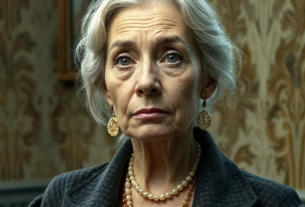— By the way, I never told you. My folks are coming next week. For about a week.
The words fell into the kitchen like heavy, filthy stones into a clear stream. Irina froze, her hand with the milk carton suspended halfway to the fridge. The crinkle of the paper carton on the countertop, the sound of her steady breathing—everything stopped. A tense, viscous silence settled over the kitchen that not even the hum of the refrigerator could break. Slowly, as if afraid to make a sudden move, she set the carton on the cool gloss of the counter and straightened up.
“What, excuse me?” Her voice was quiet, almost colorless. It wasn’t a question so much as a demand to repeat what had been said, to give her a chance to make sure she’d misheard.
Igor was leaning against the doorframe, arms crossed over his chest. On his face played the lazy, slightly condescending smirk of a man announcing something decided and not up for discussion. He didn’t move, only tilted his head a little, as if surprised by her slowness.
“My parents, I said, are coming. On Monday. What’s not clear? They called half an hour ago, already bought the tickets.”
He said it as if it were the weather forecast, and not the event that six months ago had almost destroyed their marriage. Irina slowly turned to him. She looked straight at him, her gaze heavy, probing, as if seeing him for the first time. She didn’t see her husband but a stranger, a smug man who had barged into her home and her life.
“Igor. We had an agreement,” she said, enunciating each word. No pleading, no hysteria. Only a cold, leaden statement. “You promised me. You gave your word that after that time… that they would never set foot in this house again.”
He jerked a shoulder, and the smirk on his face grew wider, bolder. That gesture—dismissive, belittling—hit her harder than if he had shouted.
“Yeah, I promised. So what? The situation changed. They’re my parents. Am I supposed to tell them, ‘Don’t come, my wife is against it’? Think for a second how that would look.”
“I don’t care how it will look,” her voice stayed even, but steel crept into it. “What matters is that you broke your word. You lied to me. After what your mother did last time… After she went through my things while I wasn’t home and then announced that I was a bad housekeeper and didn’t look after your health… Have you forgotten how we didn’t speak for a week afterward? Have you forgotten how you yourself said she’d gone too far?”
He pushed off from the doorframe and took a step into the kitchen, invading her territory. The cheer slipped from his face, replaced by irritation. He didn’t like being reminded of his weaknesses.
“There you go again. Ira, cut it out. So Mom lost her temper—happens to everyone. She apologized.”
“She didn’t apologize,” Irina snapped. “She said, ‘If I hurt you somehow, then I’m sorry.’ That’s not an apology, Igor. That’s a way to make me guilty for daring to be offended. And you stood there nodding like a bobblehead.”
“Enough!” he barked, his voice slamming against the walls. “I’m not going to discuss this. It’s settled. They’re coming. Period. I’ve made my choice.”
His words—“I’ve made my choice”—didn’t sound like a threat. They sounded like a diagnosis. Final and not subject to appeal. Irina looked at him, and something inside her—something warm and alive that still tried to find an excuse, a compromise—suddenly cooled and hardened. She felt it almost physically, as if liquid nitrogen had been poured into her chest. All the emotions—hurt, anger, disappointment—evaporated, leaving behind only a ringing, absolute clarity. She no longer saw a loved one who had made a mistake. She saw a stranger who had just taken pleasure in stating that her feelings, her peace, and her home meant exactly nothing.
Misreading her silence as submission, Igor decided to cement his victory. He walked to the table, took an apple from the bowl, and bit into it with a crunch. That juicy, defiant sound was an act of self-assertion. He chewed slowly, looking down at her, and triumph, undisguised, swirled in his eyes.
“Good, so we understand each other,” he said with his mouth full. “And if you don’t like it, if you’re not ready to show respect to my family… well then you can move in with a friend for a week. Ride it out until they leave. I think that’ll be easier on everyone.”
He said it. He actually said those words aloud, standing in the middle of her kitchen, in the apartment she had bought with her money long before they met. He suggested that she, the owner, clear out of her own home to make room for people who had once already turned her life into hell. And at that moment everything ended for Irina. Not the marriage. Not the love. The person she knew as Igor ended. He ceased to exist, crumbling to dust, leaving behind only an insolent, self-satisfied shell.
She turned away from him in silence. There wasn’t a single unnecessary movement. She didn’t finish putting away the groceries—symbols of a shattered coziness. She simply walked out of the kitchen and, without looking at him, headed down the hall to the front door. Her steps were even and firm. No rush, no fuss. Igor, surprised by this maneuver, followed her, still chewing the apple.
“Where do you think you’re going? Decided to pack a bag after all? Good. No need to make a scene here.”
Irina reached the door, took hold of the lock, and turned it. A loud, distinct click sounded. Then she pulled the door toward her, and it swung open silently, letting in the cool air and muted light from the landing. She turned to him. There was no trace of anger or hurt on her face. Only the detached, icy calm of a surgeon prepared for amputation.
“Igor, you promised me your parents would never come into our home again after the last scandal! Why are they coming here again?!”
Her voice was steady, without the slightest tremor. It wasn’t a question so much as the reading of an indictment before sentencing. She looked him straight in the eye, and for the first time he saw something there that made him uncomfortable.
“What is this, some kind of performance?” he tried to smirk, but it came out strained. “Close the door, it’s drafty.”
“You’re right,” she nodded with the same icy calm. “Someone really should move out. Right now. Go. Go to your parents. And you can stay with them not for a week, but forever. Get out of my house.”
For a moment Igor froze. His brain, accustomed to a particular scenario—her sulky silence, then tears, then his condescending reconciliation—refused to process the new reality. The words “get out of my house” were so clear and matter-of-fact that they seemed like a glitch in the system. He blinked, and genuine, almost childlike bewilderment crossed his face. Then it turned into a crooked, angry grin.
“Are you serious?” he let out a nervous laugh, stepping forward, intending to shut the damned door and stop both the draft and the theatrics. “Ira, are you out of your mind? You’re kicking me out? Over something so trivial? You’re ready to destroy our family just to keep my old folks from staying for a couple of days?”
He deliberately used the words “our family” and “our home,” trying to pull her back into the usual coordinates where everything was shared and therefore his. But Irina didn’t move, blocking his way to the door.
“No, Igor. Not ‘our home.’ Mine,” she corrected him, and that calm clarification was like the strike of a scalpel. “My apartment. Did you forget? This is my apartment. And you live here. You’re a guest who has overstayed and somehow decided he’s the master.”
His face flushed dark. Being called a freeloader was the most humiliating thing he could hear. All his feigned confidence, his role as head of the family that he had played so diligently, cracked and crumbled.
“I live here?!” he roared, shifting to a shout. “I work here, I bring money into this house! Or did you forget I’m not lying on the couch? I support you and your apartment!”
Irina tilted her head slightly, and something like the curiosity of a researcher studying a primitive organism appeared in her eyes.
“Support me? That’s interesting. Let’s do the math, Igor. My salary goes to the mortgage on this apartment, which I took out before you. To the utilities. To the groceries in that refrigerator. To the very household cleaners you’re too squeamish to use for cleaning. And where does your salary go, Igor? Remind me. Oh right. Gas for your car. The new rims you bought last month. Your Friday nights at the bar. And that expensive drone that’s been gathering dust on top of the wardrobe for six months. You don’t bring money into this house. You spend it on yourself while letting me pay for your comfortable life here.”
Each word was a dry fact, stripped of emotional coloring. It wasn’t reproach; it was bookkeeping. And that unemotional precision drove him far madder than if she’d screamed and smashed dishes.
“You… you kept track of it all? You sat there tallying who spent what? You’re so petty, calculating…” He was gasping with rage, grasping for words.
“I didn’t keep track. I just stopped lying to myself,” her voice grew even quieter, but heavier for it. “For a long time I pretended we were partners. That we were a family. I closed my eyes to the fact that you behave not like a grown man but like a sulky teenager who’s owed everything. Whose wife must provide the home while he graces her with his presence. But today you crossed a line. You didn’t just break a promise. You thought it acceptable to point me to the door in my own home. You decided you had that right.”
He stared at her, hatred and confusion mixed in his gaze. He didn’t recognize this woman. Where was the Ira who always smoothed things over, forgave, was afraid to hurt him? In her place stood a stranger—cold and absolutely impenetrable.
“You just hate my parents! You’ve always hated them!” he shouted the last thing that came to mind, the stalest and sorriest of accusations.
For the first time in the entire conversation, Irina allowed herself a smirk. But there wasn’t a drop of amusement in it.
“Your parents have nothing to do with it, Igor. They’re just litmus paper. They simply revealed who you really are. A man whose word means nothing. A man ready to humiliate his wife so he doesn’t look like a bad son to his mother. So go. Go be a good son. Your role as good husband is over. Get lost.”
The word “get lost” hung in the hallway air. It wasn’t an emotional outburst but a dry, lifeless fact. Igor stared at her, and one thought thrashed in his mind: this isn’t real. It’s some stupid, drawn-out prank. Any second now she would blink, her face would twist with suppressed tears, and everything would go back to normal. He would pretend to magnanimously forgive her, and she would pretend to be grateful for that forgiveness. But nothing happened. Her face remained an impenetrable mask. She didn’t cry. She didn’t rage. She waited.
Then it hit him. Not fury, but something far worse—panic-stricken horror at losing control. He was losing everything: this convenient apartment, this predictable woman, this well-ordered life he took for granted. And in that animal fear he groped for his last weapon. The dirtiest, most poisonous one. The kind you use when you don’t just want to win but to destroy, to scorch the earth where your opponent stood.
He slowly, deliberately, looked her up and down. His gaze was sticky, appraising, like a trader examining defective goods. Then he smirked. Quietly and nastily.
“I get it,” he drawled, venom curling in his voice. “Now it all makes sense. You’re just jealous. I have a family. A mother, a father. Real, living people who love me. And who do you have? No one. Just these walls. That’s why you go berserk when they come. They remind you how… empty you are.”
He paused, letting the poison soak in. Irina didn’t move. Her face might as well have been carved from stone. The silence spurred him on, gave him courage. He took another step in his verbal assault, aiming for the most exposed spot.
“I always wondered why you don’t want kids. All excuses—career, bad timing… But that’s not it. You’re simply incapable of loving anyone but yourself. You’re barren, Ira. Not medically, no. In your soul. There’s no warmth or life in you. Only calculation and cold. That’s why you’ll never be a mother, and that’s why my bloodline is a bone in your throat. It’s real. And you’re a fake.”
He finished, breathing hard, laying his final trump card on the table. He expected anything: a scream, a slap, a torrent of insults. He was ready, he craved it, because any reaction would mean he’d hit the target, that she was still alive, that she could be touched.
But nothing appeared on her face. Absolutely nothing. No pain, no hurt, no anger. Her eyes looked as if through him. As if he were speaking a foreign language about someone entirely different. The person he thought she was had just died for good in her gaze. In their place was emptiness. She was silent for a few seconds that felt like eternity.
Then she spoke. Her voice was terrifyingly calm, like a dispatcher reading out an evacuation procedure.
“Take the jacket from the rack. Your phone and wallet are on the console. In the blue bowl there are your car keys.”
She spoke slowly, giving him time to absorb each word. It wasn’t a suggestion. It was an order.
Igor went numb. He hadn’t expected this reaction. Complete, total disregard for his monstrous words disarmed him. He was crushed not by her anger but by her indifference.
“The keys to this apartment,” she added in the same even tone, “leave them on the console. You won’t need them anymore.”
Wordlessly, like a sleepwalker, he turned. His hands automatically found the leather jacket and took it off the hook. He picked up his phone. He scooped his car keys from the bowl, and his fingers brushed the cold metal of the apartment keys. He froze for a moment, then pulled them out and set them on the lacquered surface of the console. The sound was quiet, but in that deafening atmosphere it rang out like a gunshot.
He threw on his jacket and, without looking back, stepped over the threshold. Irina didn’t watch his back. She had turned away and was looking into the depths of the hallway, into the depths of her apartment. He stood for a second on the landing, waiting for something—the slam of the door, a parting curse. But nothing followed. He had simply been erased.
She took the handle and slowly pulled the door toward herself. The heavy slab settled into place without a sound. She turned the key in the lock. One turn. A second. The clicks were dry and final.
She stood in the hallway of her apartment. Alone. And the silence no longer felt oppressive. It was clean…



